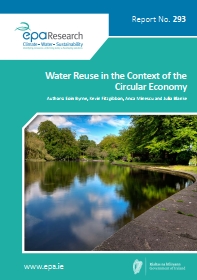Authors: Eoin Byrne, Kevin Fitzgibbon, Anca Minescu and Julia Blanke
Summary: This project addresses water reuse in the context of the circular economy in Ireland. This study has reviewed the policy background for water reuse; assessed the international practices in water reuse; examined the main technologies that are used for water recovery and their suitability; and conducted significant stakeholder engagement, including the first national public survey on attitudes to water reuse in Ireland.

Economic activity requires the input of natural resources to meet the needs of society. Most resources are finite but are often used only once and then disposed of. Water is vital for life to flourish and for society’s economic health and is scarce in some countries and regions of the world. Yet potable water is commonly used only once for societal benefit, before being returned to
the environment.
The circular economy approach seeks to recover and reuse the resources used in the economy as much as possible, to reduce pressure on fresh sources, protect the environment and improve long-term sustainability. It is being pursued with greater policy focus, in Europe and elsewhere, including for water.
The main potential sources for recovery of water, based on the volumes involved, are industries using large volumes of water, for reuse on-site, and municipal wastewater treatment plants, for reuse in the broader economy. The cost of water, and pressure for reliable supplies of fresh water, have driven the adoption of water reuse by certain industry sectors. However, no water is reused from municipal wastewater sources in Ireland.
There is no government policy in Ireland to pursue water reuse from municipal sources at present and no European Directive currently requires Member States to adopt such measures. However, the direction of travel is towards greater resource conservation, in line with “circular economy” thinking; water reuse is part of that overall picture.
There is a gap in standards for water reuse, both in Europe and in Ireland. At present there are no guidelines or compulsory water quality criteria for recovered wastewater that is to be reused in some beneficial way in the economy.
Clear messages have been received as part of the stakeholder engagement for this project, notably the public survey, which garnered 1102 responses. There is strong support for the principle of water reuse, although it is not an immediate investment priority. There is public opposition to any reuse for drinking purposes and strong doubts over reuse for agricultural irrigation for food production. Strong, early and meaningful public engagement will be vital for any municipal water reuse project to succeed.
A suitable set of water quality standards that addresses different types of end use for recovered water would be necessary for any future water reuse policies and programmes, and these should be developed. There are a number of examples internationally where such standards have been established, including by the World Health Organization, as well as individual countries within the European Union and further afield.
Collection, management and dissemination of data on water reuse by industry is at a basic level; consideration should be given to improving these processes.
When future water reuse programmes are contemplated, a meaningful public engagement process will need to be designed that avoids any suggestion of a minimalist approach or a one-way information-giving exercise. Factors such as emerging and exotic compounds, bioaccumulation, migration into groundwater and associated impacts will need to be considered as part of a risk assessment/environmental impact assessment process.
https://www.epa.ie/media/archive/research/research-thumbnails/Research_293_thumbnail.jpg